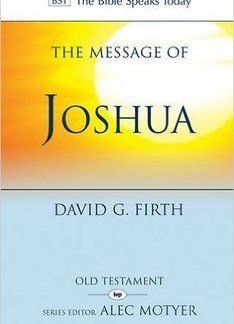A college lecturer specialising in the Old Testament, David Firth has authored several commentaries on the Hebrew Scriptures prior to this volume. His expertise in the Hebrew language and Israelite customs inform this book throughout, making it an enjoyable read. Part of the ‘Bible speaks today’ series, the book aims to guide lay readers through Joshua, providing theological insight and practical application along the way.
In their broadsides against God’s goodness, critics often decry the Israelite ‘invasion’ and ‘ethnic cleansing’ of the Canaanites recorded in Joshua. I was pleased that Firth addressed this issue at the book’s outset. He notes that, firstly, land belongs primarily to God; it is his right to give it to whom he pleases.
Secondly, the conquest of Canaan was not fundamentally ethnic (Israelite versus Canaanite), it was more those choosing to follow God against those choosing to resist. The Canaanite Rahab’s assimilation into God’s people and the Israelite Achan’s separation and execution evidence this truth; the key issue is, as ever, obedience and faithfulness rather than genetics.
Following the introduction, the book divides into 18 relatively short chapters, sequentially working through Joshua itself. A swift and readable pace is maintained throughout; the commentary never bogs down in finer points of archaeology, linguistics or customs.
As expected, more space is given to the first half of Joshua, where most of the well known action transpires. I found Firth’s comments accessible, insightful and pertinent. For instance, while reflecting on the significance of the Gilgal memorial stones (Joshua 4), Firth comments, ‘The challenge for us today is to ensure that our own memorials (whether the Lord’s Supper, baptism or our own testimonies) do the same, inviting discussion about Jesus, strengthening us in our own pilgrimage, and ensuring that we always look outwards to a needy world around us’ (p.62).
A strength of the book is its frequent application of the ups and downs of Joshua and the Israelites to modern-day Christians and the church. Such writing reminds us how the Bible is a ‘living’ book, whose 3,000-year-old annals can be so rich in up-to-date spiritual guidance.
I have only two reservations. Firstly, the author claims that what is perhaps the most famous miracle in the book — Joshua’s ‘long day’ in chapter 10 — is probably no more than ‘figurative’ language (p.123).
Secondly, I found Firth a little harsh in his remarks on the latter half of Joshua. To be sure, it is preoccupied by extensive lists and land allotments, but to characterise the Word of God, in various places, as ‘impenetrable’ in its ‘mind-numbing’ detail (p.141), ‘more than just a little dull’ (p.141), making readers’ eyes ‘glaze over’ (p.144); a ‘real nightmare’ (p.147) and something to ‘battle our way through’ (p.183) with its ‘seemingly endless’ lists (p.197), seemed to labour the point and be irreverent. Those reservations aside, I enjoyed and recommend this book.
John Tredgett
Carlisle





